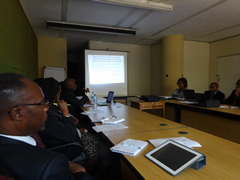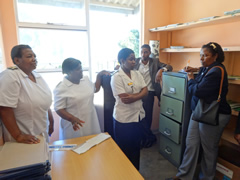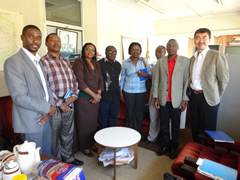- Home
- Technical Cooperation Projects
- Index of Countries
- Africa
- Tanzania
- Health Systems Strengthening for HIV and AIDS Services Project
- Project News
- Tanzania learns from Zimbabwe on clinical mentoring (July 2014)
Project News
2014-07
Tanzania learns from Zimbabwe on clinical mentoring (July 2014)
A study tour to Zimbabwe was conducted from 6th to 12th July 2014. The purpose of this activity was to learn from Zimbabwe that has introduced clinical mentoring as a nation-wide clinical support system for anti-retroviral therapy (ART) and opportunistic infections (OIs) treatment since 2009, a little earlier than Tanzania. Participants from Tanzania were six including the Programme Manager of the National AIDS Control Programme (NACP). The Ministry of Health and Child Care (MOHCC) of Zimbabwe officially welcomed the Tanzanian delegation. They made all the necessary arrangements for the tour and appointed an MOHCC official and a driver to attend the team throughout the tour and allocated a vehicle for the tour. The tour began with a courtesy visit to the Deputy Minister, followed by exchanging experiences and ideas with the MOHCC Clinical Mentoring Technical Working Group members. The team visited several clinics in three provinces, namely Manicaland, Mashonaland West and Harare, and interviewed mentors, mentees and trainers. The team also visited National AIDS Council (NAC) to know about the AIDS Levy. At the end of the tour, the team made feedback to the technical working group and met the Minister for debriefing.
While Tanzania is using a site-visit approach by a single mentor depending on needs identified by supervisors, Zimbabwe has been applying three mentoring approaches: 1) mentoring outreach (site-visit) by a team of mentors, 2) mentees' clinical attachment to a hospital and 3) mentoring through information communication technology (ICT). These approaches could be flexibly applied in Tanzania as well, depending on the situation and needs of service provision site such as volume of clients, available human resource, and performance during the conventional off-site training, urgency and characteristics of the needs.
The team also learned that a levy is charged on individuals and companies (formal sector) at 3% of income for domestic financing of HIV prevention, care and treatment. Of the fund collected, 55% goes to support for ART including procurement of drug, commodity and laboratory equipment. Capacity building activities can be also supported by the fund. It is flexibly managed to meet emerging local needs. The government is aiming to reach 50% of the requirement for ART through expansion of the levy. The government's efforts for domestic financing astonished the Tanzanian delegates.
The study tour was successful and inspiring to Tanzanian delegates and the findings should be shared with other colleagues in Tanzania.
 Tanzanian delegates exchanging experiences and ideas with Zimbabwe Clinical Mentoring Technical Working Group
Tanzanian delegates exchanging experiences and ideas with Zimbabwe Clinical Mentoring Technical Working Group
 Tanzanian delegate interviewing nurses (mentees) at Dangamvura Poly-Clinic
Tanzanian delegate interviewing nurses (mentees) at Dangamvura Poly-Clinic
 Courtesy visit and interview to the Provincial Medical Officer of Mashonaland West
Courtesy visit and interview to the Provincial Medical Officer of Mashonaland West
- About JICA
- News & Features
- Countries & Regions
- Our Work
- Thematic Issues
- Types of Assistance
- Partnerships with Other Development Partners
- Climate Change / Environmental and Social Considerations
- Evaluations
- Compliance and Anti-corruption
- Science and Technology Cooperation on Global Issues
- Research
- JICA Development Studies Program / JICA Chair
- Support for the Acceptance of Foreign HRs / Multicultural and Inclusive Community
- Publications
- Investor Relations
